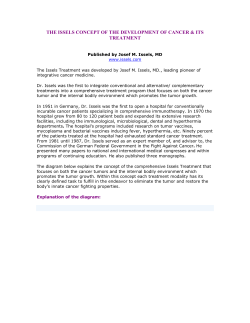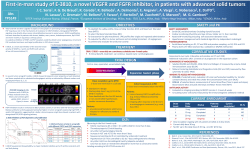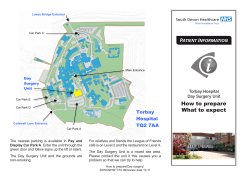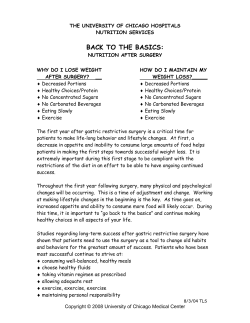
How to be a Rockstar Healthcare Advocate
Transform Your Brain Tumor Healthcare Experience How to be a Rockstar Healthcare Advocate Top 10 Vital Questions to Ask Your Doctor Immediately When Diagnosed with a Brain Tumor 1. What kind of brain tumor do I have and what is the expected prognosis and treatment protocols? 2. How many brain tumor patients are treated annually at your center? And by you? Are you an Oncologist or a Neuro Oncologist? 3. If surgery is required, what are the various surgical options available at your center? How many surgeries has my neurosurgeon personally performed? 4. What happens to my brain tumor tissue once it has been removed during surgery? Can it be used to inform you and others of any advanced treatment options? 5. What are the available standard treatments at your center and what other treatments would you consider, if needed? 6. Can you tell me about clinical trials in your medical center currently enrolling patients for my type of brain tumor or other sites where I may enroll in one? 7. Would you consider ordering genomic testing for me and how might we use my genetic information to find specific genetic targets? Do you use the FoundationOne test for your patients? 8. Does your center offer an integrative support program? 9. Should I be concerned about too much exposure to radiation? 10.How will I be followed up for recurrence and how often will I get imaging studies completed? I am concerned about exposure to too much radiation. See reverse for explanations of these questions. Would you like assistance in addressing these questions with your doctor? The Chris Elliott Fund is here to offer help and hope. Contact us today. U: 08-11-14 www.chriselliottfund.org ©2014 Chris Elliott Fund, All Rights Reserved Chris Elliott Fund th 14959 NE 95 St. Redmond, WA 98052 1-800-574-5703 wecare@endbraincancer.co Answers You Should Be Listening For: 1. Answer will be determined by an MRI scan and/or pathology test done following surgery or a biopsy. Confirmation of tumor type requires a pathology test which in some cases may not be an option if the nd rd tumor is “inoperable.” It is critical to get a 2 and sometimes even a 3 opinion, as not all tumors noted “inoperable” are truly inoperable. The discretion and skill of the neurosurgeon as well as the equipment and technology being used is factored into that determination. Recommended standard FDA approved treatment protocol after surgery usually includes chemotherapy and standard radiation depending on the type of tumor and whether it is malignant and operable. It is also important to ask if testing is available to determine how well a tumor will respond to standard protocol. That is to test specifically for “MGMT promoter methylation”, a favorable prognostic marker in either radiation or chemotherapy. 2. Find a brain tumor center that uses a multi-disciplinary approach, has brain tumor specialists (e.g. a neurosurgeon and a neuro-oncologist who sees 200+ patients annually). Research the history, training, and education of your doctors. 3. The brain tumor center should perform awake brain-mapping operations, use intra-operative imaging, image-guided technology, have someone dedicated to monitoring neurological function during awake surgery, and an on-site neuro-pathologist to review brain tissue at the time of surgery. 4. It is critical to have your surgically removed tissue saved through cryo-preservation for genomic testing and analysis. Insure that your tissue is further researched either at your center or able to be shipped to nd rd other centers/neuro-oncologists for 2 or 3 opinions as well as pre-clinical trial information. It is vital that this paperwork and these options be discussed and signed prior to your brain tumor resection or surgery. 5. Look for a major treatment center that has a wide range of treatment options such as: CyberKnife, Gamma Knife, and Proton Radiation. Discuss whether you are a candidate for these with your multidisciplinary team. You may need to travel to have these treatments. Other options might include Gliadel wafers, a dissolvable wafer implanted at the tumor site at the time of surgery to deliver medications directly to the brain, the Novo TTF device, and the FoundationOne test. 6. Find out how many active clinical trials are at the medical center and what phase the trial is in (1, 2 or 3). Ask about upcoming clinical trials and how many patients are enrolled in these trials. Be sure to ask if having surgery, chemo or radiation would exclude you from any of the clinical trials. 7. Foundation Medicine has recently introduced the FoundationOne genomic sequencing test that looks at alterations in the 200+ genes have been identified as potentially cancer-related and links any abnormalities it finds to specific targeted treatments (where they exist). The test must be ordered by the surgeon prior to surgery so that sufficient tissue is available for the extra pathology slides required for this test. 8. Ideally your physicians work as part of a team with other professionals involved in your care. Integrative Care usually includes the involvement of a social worker who may provide patient counseling, family support and referrals to needed resources, such as a nutritionist, counselor, etc. Thus, it is important to ask who is included on your treatment team and the role of each person in your treatment and care. 9. As mandated by the FDA, standard of care involves a scan every 8 weeks during treatment to limit exposure. 10. Knowing statistics may be daunting. However, your treatment team can prepare you for any eventuality and should include how often you will be followed up in the discussion of your overall treatment plan. www.chriselliottfund.org ©2014 Chris Elliott Fund, All Rights Reserved 2
© Copyright 2025





















